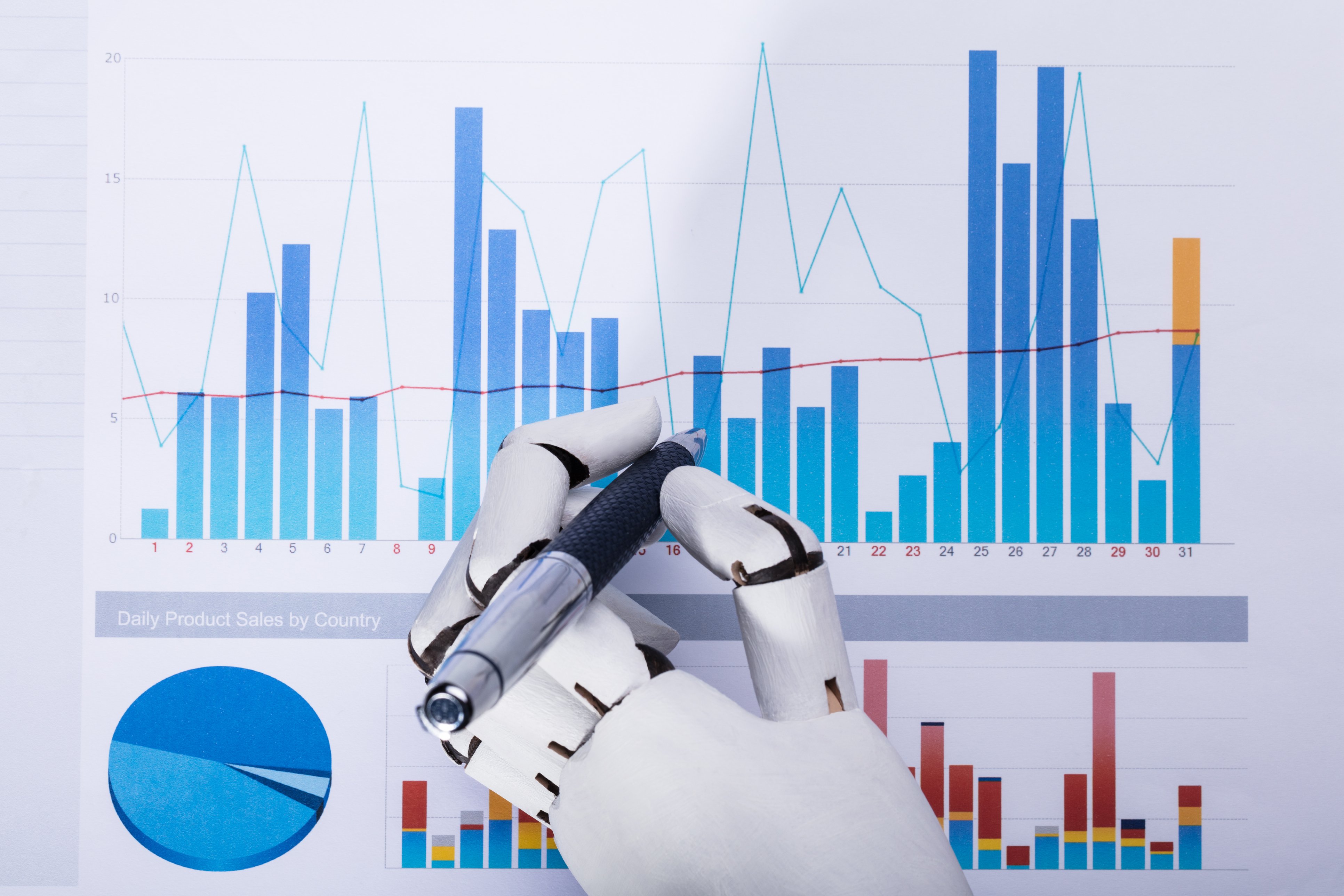October 30, 2023
 by Catarina Hoch / October 30, 2023
by Catarina Hoch / October 30, 2023

In the evolving, digitally-driven world of sales, teams feel the need to stay competitive.
Sales teams are increasingly adopting artificial intelligence (AI) to stay ahead of the curve, optimize workflows, and achieve desired results. Several AI tools in the market make choosing one that fits your team’s specific needs challenging.
In this article, we discuss how AI fits into the world of sales and explore use cases, challenges, benefits, and the types of tools that help optimize complex sales processes.
AI for sales represents the use of AI technologies within parts or the entirety of a sales team. This can range from the use of advanced algorithms and data analysis to simply requesting a large language model (LLM) to write email responses.
The use of AI in sales has risen dramatically, with 69% of sales professionals agreeing that by 2024, most people will use AI or automation to assist them in their jobs.
AI has transformed the sales landscape, working behind the scenes to increase the effectiveness of sales engagements and lead generation while bolstering team productivity. Incorporating AI-driven insights has redefined how sales teams work, making processes more efficient and interactions more tailored.
It is clear that AI has grown beyond being a mere tool to a necessary part of businesses aiming to thrive in the digital era rather than be left behind.
AI has several use cases within an organization, and within sales, AI helps boost productivity, optimize processes, and tackle several jobs to give time back to salespeople to work on other priorities.
According to HubSpot’s report, sales professionals harness the power of AI for automating manual tasks (35%), gaining data-driven insights (34%), and crafting prospect outreach messages (31%).
There’s also data that says among sales professionals utilizing AI, a remarkable 85% attest that it enhances their prospecting endeavors. This translates into more time devoted to selling (79%) and a faster establishment of rapport (72%).
Here are the key reasons why sales teams and businesses can benefit from utilizing AI.
In a recent episode of the B2B Revenue Acceleration podcast, John Barrows acknowledged the importance of using AI in sales to increase productivity.
“Let the AI do all the heavy lifting. Let it do the research for you. Let it write the email, let it write the presentation of the proposal, but right before it goes out the door, make sure you humanize it.”
“I think it's a massive opportunity for those of us who figure out how to use AI to give us the time back so we can spend more time selling.”
John Barrows
He says, “There's a report that just came out with Salesforce that said the average sales rep only spends 28% of their time actually selling. So if we can use AI to do all that stuff that takes us away from selling and gives us more time back to engage with the client and have the relationship and the rapport, then it's like a superpower.”
Using AI in sales processes can take away these more menial tasks, allowing your team to focus on the most important job of all: selling.
No matter how great your sales team is, there are always going to be human errors, delays, and inefficiencies. This could be misspelled names, grammatical errors, or blank form fields.
AI automates workflows, streamlines project management, and offers intelligent suggestions to accelerate deal closures while eliminating human error. AI can also handle follow-ups and reminders, resulting in shorter sales cycles and improved revenue streams.
AI can be used to transform raw data into actionable insights, strategies, and best practices within a matter of seconds. These tools quickly analyze customer data, interactions, and sales conversations to reveal incredible insights into behaviors, preferences, challenges, and purchasing patterns.
AI extracts key insights to enhance future engagements by analyzing emails, phone calls, or chat logs of sales teams. It identifies patterns, results, and tactics employed by top-performing salespeople, revealing the approaches that truly work for a team.
For salespeople, it is a challenging job to find a prospective customer’s contact details or prioritize the right prospect or contact based on business needs.
AI improves this lead generation process by identifying potential leads, as well as providing up-to-date contact information and insights into lead behavior. With predictive lead scoring, AI helps sales teams prioritize prospects with a higher likelihood of conversion, thus optimizing their efforts for better results.
AI offers the ability to predict trends, foresee challenges, and adapt to market changes with ease. By doing so, you can refine your strategies and priorities based on data-led forecasting, ensuring you bring more predictability to your sales forecast.
While the integration of AI in sales offers an array of benefits, some challenges must be considered to ensure success.
Striking the right balance between AI automation and genuine human interaction is one of the most significant considerations.
Over-reliance on AI can risk increased impersonal interactions, negatively impacting customer experience. Sales teams must be empowered to understand when genuine human engagement is required to nurture a lead.
Resistance to adopting AI is common but often stems from a fear of job loss or a distrust in the ability of these tools.
This can be overcome by facilitating open discussions about changes to the job role and regular training sessions that demonstrate the capabilities of AI in sales.
While AI tools remove much of the heavy lifting in the sales process, ongoing training is required to ensure your team uses them effectively. This rings particularly true for tools that are updated regularly with new features.
The acquisition, implementation, and maintenance of AI systems can be expensive. Make sure to weigh in which tools are necessary and prioritize the ones that will have the biggest positive impact on your team.
Using AI in sales can raise privacy concerns.
Data used by AI often includes sensitive information. Companies must incorporate measures to protect data and respect customer privacy. This means implementing strong data protection measures, complying with privacy regulations, and being transparent about how customer data is handled.
Striking the right balance between AI's benefits and customer privacy is crucial for maintaining trust and using AI ethically in sales.
The seemingly endless number of sales tools available on the market makes it difficult to choose the best from the lot. Below are some of the common and most useful categories of sales tools that empower sales teams to manage their processes better.
AI-driven conversation and sales analytics tools go beyond transcribing calls and meetings. These tools offer data-led insights into customer perception, objections, and areas for improvement within sales conversations.
These tools enhance training and provide a deeper understanding of what really works by assessing sales reps' performance. They deliver practices that allow teams to track performance, identify trends, and make real-time adjustments to their strategies with ease.
AI-infused CRM systems help prioritize leads and opportunities. They automate data entry, which is often cumbersome, freeing up time for sales professionals to focus on selling.
AI-backed CRMs provide rich insights into customer behavior, enabling businesses to tailor their interactions and offerings with a new level of precision.
AI and predictive analytics tools use historical data and sophisticated algorithms to predict sales trends, anticipate challenges, and adapt to industry changes.
Sales automation takes out administrative tasks such as lead nurturing, email outreach, follow-ups, and appointment scheduling.
A new approach to lead management, AI algorithms assign scores based on a lead's likelihood of converting. This process allows teams to prioritize follow-ups.
AI sales tools provide valuable lead data, including up-to-date contact information, job titles, and insights into buyer movements. This data improves lead profiles, ensuring that sales teams have the right information to make informed decisions and have meaningful connections with prospective customers.
Email tracking with AI offers unique insights into email interactions, engagement metrics, open rates, and responses. This allows salespeople to send timely and effective campaigns, as well as follow-ups.
AI sales tools take away guesswork associated with research and personalization. They mine vast datasets and provide insights into individual accounts, their behavior, and preferences. They enable sales teams to create tailored campaigns that resonate with the specific needs and pain points of each customer.
Implementation is a crucial step in the journey to adopting AI in sales and reaping the benefits of integrating AI tools into existing sales processes.
Here are some steps, best practices, and pitfalls to avoid to help ensure the smooth implementation of AI tools.
Start by defining your specific goals and objectives for using AI in sales. Goals can include improving lead generation, enhancing customer interactions, or optimizing sales forecasting processes. Evaluate your current sales processes and discuss with salespeople to identify areas where AI can be most beneficial.
Begin with small-scale trials to test the selected AI tools and their impact on your sales processes. Gather feedback from your sales team during this phase to asses if the cost is worth the results. Keep an eye on metrics to see if it improves your results.
Ongoing training is an essential part of getting the best results from your AI in sales tools. Conduct a detailed training session, and encourage your team to approach you with any questions should they be confused.
Ensure that customer data is secure by implementing robust security measures and complying with relevant laws and regulations from the get-go.
Continuously monitor the performance of AI tools and their impact on sales outcomes. Compare these metrics to your pre-AI baseline to determine the impact of AI on your sales processes.
To measure the impact of using AI in sales, you need to keep track of key sales metrics. Here are important things to consider when evaluating the effectiveness of AI-driven sales initiatives.
To assess AI's contribution to results, establish clear key performance indicators (KPIs) such as conversion rates, lead quality, or sales cycle. Compare data from before and after the implementation of tools.
These metrics should match your sales goals and assist in determining what is effective and what is not.
Determine how well AI-generated insights and recommendations perform compared to those provided by a human salesperson.
Consider the data-driven suggestions from AI and compare them to the expertise and intuition of your sales team. Finding a balance that maximizes the capabilities of both AI and humans is crucial.
The sales industry is evolving, so it's important to watch new AI tools and strategies. The sales landscape and customer behavior change over time, with new tools being launched.
Regularly check if your AI tools match your goals - being flexible is key to getting the most out of each tool.
An increasing number of AI tools are being launched, which means AI will continue to reshape the way sales teams work. While there are concerns about AI’s impact on job roles, real human interaction and connection are still a vital part of the sales role.
The future of sales is set to experience ongoing growth, innovation, and triumph with AI as a reliable partner. Incorporating AI into sales is not merely an option; it is a crucial strategy for businesses aiming to flourish in a progressively competitive market.
Learn more about sales strategies and how to boost your sales process.
Catarina Hoch is the VP of Global Marketing at Operatix. With a strong background in sales development and over a decade of experience in B2B marketing, her area of expertise revolves around crafting and executing global marketing strategies, from Brand to Demand Gen and beyond.
Concerns about inflation have greatly affected competition in e-commerce.
 by Melike Ulaman
by Melike Ulaman
Do you know where the bottlenecks are in your business?
 by Alok Goel
by Alok Goel
Email is one of the go-to forms of communication for many companies who want to connect with...
 by Michael Bibla
by Michael Bibla
Concerns about inflation have greatly affected competition in e-commerce.
 by Melike Ulaman
by Melike Ulaman
Do you know where the bottlenecks are in your business?
 by Alok Goel
by Alok Goel


